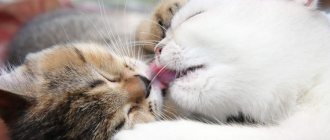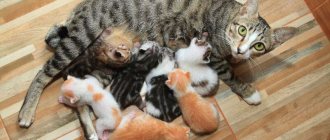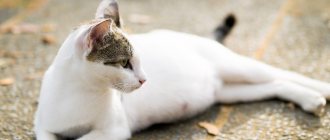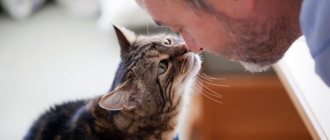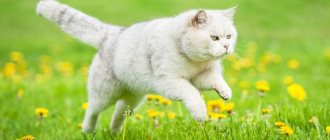When choosing a pet, many people want to get a cat rather than a cat, associating this with the fact that there are fewer problems with a cat during puberty. There is also no need to further accommodate the born kittens. It is not difficult to understand that a cat is asking for a cat, since a male animal shows this very clearly. Not many people know that a cat can show a desire to mate all year round, and not just in the spring. It is worth remembering that once you show readiness to procreate, the cat cannot be re-educated.
How to calm a cat during spring?
The second way to calm an anxious pet in the spring is to give your cat special “anti-sex” pills during the period of heightened instincts. You can find them in almost every veterinary pharmacy. The drugs are divided into two groups: herbal drugs and hormonal tablets.
Interesting materials:
What does a heart tattoo mean? What does a heart tattoo on the shoulder mean? What does an elephant tattoo mean? What does an infinity sign with a feather tattoo mean? What does a panther tattoo on a leg mean? What does a Cerberus tattoo mean? What does it mean to match you? What does it mean that technical support by phone has expired? What does a current account on a card mean? What does it mean that the subscriber’s phone is temporarily unavailable to Tele2?
Puberty
Males reach sexual maturity a little later than females. So, if a cat becomes ready to mate at the age of 5-6 months, then males become ready to mate from 9 to 12 months. There are cats that mature by the age of two, and this depends on many factors - diet, the presence of an animal of the opposite sex in the house, genetic characteristics.
Factors determining the period of onset of puberty:
- breed affiliation;
- skeletal structure (elegantly built pets with a fine bone structure, mature earlier than their more powerful relatives);
- season;
- habitat;
- predisposition at the genetic level.
The time when a cat matures for procreation is marked by the beginning of marks. The animal begins to mark the territory in which it considers itself the rightful owner. It is rare, but it happens that a cat does not mark the room in which it lives.
The period of intensification of sexual desire usually occurs in the spring. But cats, unlike cats, can mate all year round. This is due to the fact that males have their own specific periods of activity, depending on the individual characteristics of the body.
How to determine a cat's heat: tips and reviews
Tips regarding estrus in cats
As experienced cat breeders note: “If you are not going to breed your cat regularly, then let her give birth at least once, and then sterilize her.”
This scheme will relieve the pet’s owners from the unpleasant manifestations of estrus and will help maintain the cat’s health.
After all, it is believed that a pussy must give birth at least once before becoming infertile.
If for some reason it is not possible to sterilize a cat (I feel sorry for the animal), then it is better to follow all the above tips and try to make this period easier, both for yourself and for her.
If you nevertheless decide to breed kittens, then having discovered the first signs of strange behavior of the animal, you need to transport it to a potential inseminator. If you miss even a couple of days, you risk missing ovulation.
Signs of estrus
To attract males, females use 2 tools: voice and smells. All sounds made become rougher and louder. Frequent but light urination occurs not only in the litter box - the pet leaves odorous marks on vertical and horizontal surfaces. Raising her tail and turning her back towards the target, she secretes a few drops of urine.
Another way to place marks is by rubbing them on objects. The glands on the cheeks of furry pets secrete a special secretion, allowing them to leave an individual scent.
The signs of the first menstruation are identical to subsequent ones. They are distinguished only by their weak expression in young animals.
Remember that discharge during “critical days” should be transparent. The appearance of blood or pink clots is a dangerous symptom that requires diagnosis.
How to relieve symptoms of estrus
No cat owner, even the most patient, can like the fact that both day and night his pet, who has entered the breeding age, howls, bites and is overly active and aggressive. At such moments, the question arises of what to do with a cat whose antics can no longer be tolerated.
The easiest way to resolve the issue is to arrange a “date” for the tailed brawler with a suitable cat.
It should be taken into account that you need to choose the most suitable time for mating. The peak of sexual activity in animals whose age allows them to reproduce occurs between February and March. It is at this time that it is more advisable to have offspring, guided by the simplest logic. In the coming summer months there will be no problems with obtaining food for the babies, the cubs do not need to be protected from the cold, and by the first serious frost they will already have reached adulthood.
This path is suitable for owners of purebred animals and those whose cats, having entered adulthood, walk on their own and live in the courtyard of a private house. In a city apartment, a low-bred wild animal can hardly become a prominent and sought-after gentleman . In this case, it is necessary to consider other ways to resolve the issue.
Folk remedies
Herbal infusions can be used as a sedative. To prepare the first product you will need to perform the following manipulations:
- take 1 part catnip and 2 parts each of motherwort, hops and Baikal skullcap;
- from the resulting collection take 1.5 tbsp. l.;
- pour 0.5 liters of boiling water over the herbs;
- let it brew for 5 hours;
- strain the product and squeeze out.
The finished infusion should be given to the cat four times a day, 1 tsp. after he eats, or add directly to food. In order to calm a pet that needs a cat, you can also use the following infusion recipe:
- take equal parts of motherwort, plantain, marsh grass, horsetail, hawthorn, licorice root and peppermint leaves;
- take a couple of dessert spoons from the resulting collection;
- pour 0.6 liters of boiling water over the herbs;
- let the product sit for 24 hours;
- squeeze and strain the infusion.
It is recommended to feed the male with the prepared product at least 4 times a day. You can add it to food or drink it from a syringe without a needle before starting a meal. Traditional medicine can only temporarily calm a four-legged pet.
Giving a cat valerian is strictly prohibited. An infusion of valerian will not calm the male, but will make him even more aggressive and uncontrollable.
If not hormones, then what?
Since hormonal drugs can be harmful, it is better to use more gentle options. For example, “Fitex” or “Cat Bayun”. These are herbal-based preparations, therefore they are the safest for cat health. “Palladium”, “Bromine” and “Ignacia” have also proven themselves well. These are homeopathic remedies that have a gentle effect on the body and do not cause side effects. In addition, the result is achieved almost immediately after use.
Many veterinarians advise sterilization if the owner does not want the cat to give birth to kittens. After the operation, the pet will no longer walk and will not be able to get pregnant. The pills temporarily suppress her arousal. And besides, they can cause irreparable harm to health. It makes sense to use such drugs if mating is not planned now, but in the future the owner plans to breed a cat with a cat. What exactly to choose, sterilization or taking sedative hormonal medications, it all depends on the decision of the pet owner, as well as the health and age of the animal. Read more about the use of sedatives here.
This article discussed how to understand that a cat wants a cat, when it is recommended to breed and how to do it correctly. Each cat has its own character and preferences. And it is important to learn to understand your pet. If the owner does not want the cat to give birth, it is better to undergo sterilization surgery. Of course, you can use various drugs to suppress your pet’s sexual arousal, but many of them, especially hormonal ones, can be harmful to health.
How does a cat feel during heat?
Feelings of a cat during estrus
Many owners, during the estrus of their pet, try to protect themselves from her constant screams and friction. However, they must understand that the animal is not to blame for its condition.
A cat, especially one that is not mated, does not understand what is happening to it..
She simply feels an irresistible desire for affection and love. Her genitals are overexcited and send strange signals to the brain. Perhaps she herself would like not to feel all these incomprehensible things, but nature came up with everything just like that.
Has the cat gone on a spree or not?
First, you need to understand what is happening to the pet. Cats are independent animals, it’s not for nothing that people say: “A cat walks on its own!” They love their owners and are devoted to them, but at the same time they always keep their distance. People have to be extremely attentive to their pets.
Less than a year after birth, cats become sexually mature and begin to walk.
Now they are able to mate. We must remember that males are ready to meet a female at any time . Is your pet acting strange? Some signs that a cat has gone on a spree:
- the animal behaves aggressively towards its owners and other pets;
- the cat marks the territory;
- obsessive desire to leave the house, take a walk;
- screams inviting a female;
- frequent urination.
© shutterstock
If your cat goes on a spree for the first time, it is advisable to contact a veterinarian. A competent specialist will tell you how to behave in this situation, and most importantly, how to calm the cat. Professional advice and guidance is always needed. After all, we are talking about a living being. Any mistake can harm the pet and add problems and troubles to the owners.
Do spayed cats go into heat?
Do spayed cats go into heat?
As a rule, after a cat is spayed, she will no longer show obvious symptoms of estrus. She doesn't scream at night and doesn't rub herself against men. And that's okay.
However, it also happens that all of the above signs of estrus are present even after the process of removing part of the genital organs. It's very difficult to explain, but it happens.
In this case, you can let the cat surrender to the call of nature and take her to the cat. Such mating will certainly not give any result, and there will be no kittens.
Regulation of sexual estrus
If the cat is purebred and the owner plans to get offspring from such a cat in the future, then it is recommended to breed him with cats that have a good pedigree. In some cases, breeders advise buying a female that has previously been sterilized (ligation of appendages). The cat will be ready to mate, but in this case there will be no offspring. It will be easier for the cat to cope with his natural instincts, finding an outlet for energy.
Another method that allows you to calm a cat during the mating season is the use of special hormonal drugs. All contraceptives are designed to artificially suppress an animal's desire to mate. In addition, when taking hormonal substances, signs of sexual desire decrease.
Note! The dosage and timing of taking hormonal drops or tablets should be prescribed exclusively by a veterinarian after prior consultation.
Medications for regulating sexual desire can be of plant or hormonal origin. Hormonal drops are widely used in home practice, giving an easy and quick effect, but not long-lasting. A large number of cat lovers believe that the use of oral contraceptives for cats in the form of drops or tablets is much more humane than sterilization or castration.
There is an opinion that this is a safer method of regulating sexual desire. Veterinary experts and scientists say that tablets and drops are a time bomb. A one-time use of a hormonal drug once a year (for example, in the spring) will not harm the body.
Systematic, constant use of drops can cause serious disorders in the animal’s body, including death. This is due to the fact that contraceptives for cats contain a dose of a hormonal substance that blocks the production of physiological hormones.


